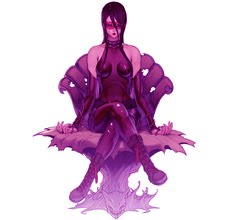
Although I was not fortunate enough to have caught this while it was still in theaters, I managed to snap a pic of this DVD poster while in Akihabara, Tokyo. The much anticipated wait for us overseas fans finally erupted over the past weekend as the final Kara no Kyoukai DVD hit the shelves in Japan. Two years of repeated excellence are coming to an end at last with the haunting and gratifying finale of, arguably, Kinoko Nasu and Type-Moons' best work to date.
While this may not be the most exciting installment of the seven part series, it offers very appropriate closure and delves into tying off the loose ends of several major themes that have run its course throughout the story. Finally, we see the reasons behind the complex mentality of Shiki, the unraveling of Souren's plans, and the ultimate cause and effects that led way for some of the most intriguingly discombobulated storytelling in the history of anything I've ever seen.
Kara no Kyoukai (The Garden of Sinners) -
A Study in Murder (Part 2)
(殺人考察(後)
SYNOPSIS
The story begins a month after the events of Oblivion Recorder. A series of gruesome murders in the back alleys of the city raises many eyebrows when eye-witnesses claim that a "person wearing a kimono" was seen at the events. Fueled by suspicion and worry, Mikiya Kokutou begins to track various leads that may unveil the true homicidal maniac, while still hoping that the recently missing Ryougi Shiki is not the culprit. Discussion with Aozaki Touko does not aid his conscience, as she talks of Shiki's lost alter ego and her need to fill that void of murderous intent. It then becomes Kokutou's task to save Shiki from destroying herself before time runs out.
REVIEW (spoilers!)
The key points of this final movie have nothing to do with Lio, the homicidal maniac, but rather Shiki's personalities and her relationship with Kokutou. Lio's role in this story was to disprove that Shiki's murderous intent was a blind one, since his homicidal habits were a result of Souren awakening his beastly origin, and not born from the pain and circumstances that Shiki endured. This is reinforced during Kokutou's conversation with Touko about the difference between murder (with intent) and slaughter (without intent). Shiki has been able to control the former all this time, while Lio's primal need for consumption demonstrates the latter. Moving on - the most important scene, to me, was the flashback when Shiki's alter ego chose to throw herself in front of the car. Two important notes on that scene: Souren's observation that Shiki should not be killed at such an early age (as he knew she carried the potential for something greater) and thus the spiral of contradictions that would ultimately lead to his own demise. The second is that Shiki's alternate ego, one who could not control the murderous intent, chose to sacrifice herself over killing Kokutou. The sacrifice was testament of Shiki's true desires to live a life of normalcy with Kokutou. Another very important theme that this movie touched upon was the idea of only being able to "kill one person in your lifetime". These were Shiki's grandfather's parting words right before he left the world - "We have but one chance in our lives to allow ourselves to die. They say it's your life, but that doesn't mean that it belongs to you. You can only kill someone once. Those who have killed someone once and used it up can never kill themselves, and never die as a human." Very deep words that carry a line of thinking I've never even thought of. In the final moment, when Shiki kills Lio out of revenge, she falls in the snow and wonders at how Kokutou wouldn't forgive her. Lucky for the both of them, a knife stab in the face isn't enough to kill Kokutou. While they embrace, Kokutou tell her that it's okay because he would be the one to "kill her" by bearing her sins in her place. This brings a roundabout back not only to the entire "killing one person" mantra, but the relationship between Kokutou and Shiki. The reason why Shiki was able to suppress the urge to kill and not fallen into the category of "homicidal maniac" is separated by the consciousness that loving Kokutou had given her.
As I've stated before, the movie itself was not the most impressive. In order to give fans their fill, the movie was lengthened to a full two hours, which I believe could have done without the extra half hour. A few things bugged me, namely: Mikiya still being a useless pussy (seems to be a running theme for main character guys in Japan), Shiki and him never kissing (reinforced), Mikiya having the hardest head ever, and much lost suspense by dragging out the film.
However, when I step back and look at the whole, it makes sense to do it this way. This final movie was a perfect, melancholic closure. The apex of the story was indeed during Paradox Spiral and the defeat of Araya Souren, but what is amazing is that his master plans and failed experiments are still in motion all this time and integral parts to completing the viewer's puzzle. The construction and storytelling of Kara no Kyoukai is what makes the series so intriguing, and the beautiful animation and effects that make it so breathtaking. Without a doubt one of the most amazing anime I've ever seen, Kara no Kyoukai will forever haunt my memories in all of its complex and horrifying beauty.
Thanks to everyone for my 21st birthday. Unfortunately, what happens in Vegas stays in Vegas. Maybe I'll bring myself to tell the "epic story" sometime in the future. In other news - got my Xbox360 only a year late. Grats me (thanks Genny!)

























